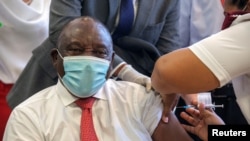It did not hurt a bit, South African President Cyril Ramaphosa said Wednesday, shortly after he became one of the first South Africans to receive the hot-off-the-plane coronavirus vaccine at a public clinic in Cape Town’s sprawling Khayelitsha township.
“At first, I was a bit terrified of this long needle that was going to be imbedded into my arm, but it happened so quickly, so easily, it was just a prick on my flesh, and I really did not feel much pain,” he said.
The 68-year-old president did ask the nurse if he could close his eyes before getting the one-dose Johnson & Johnson vaccine in his left arm, just hours after 80,000 doses of the vaccine landed in South Africa. He smiled and laughed as she administered the shot. The crowd clapped.
But seriously, Ramaphosa said, this is a big deal. The first shots will go to front-line health workers at public and private clinics. He encouraged his fellow South Africans not to fear the prick.
“This day represents a real milestone for us as South Africans that finally the vaccines are here, and they are being administered,” he said.
“And I was rather pleased that there were five people who were vaccinated before me, and they are health workers, and it was a joy to watch them to see whether anything had happened to them,” the president said, prompting laughter. “Gladly, nothing had happened to them.
“It means that being vaccinated, it's a fairly straightforward process. And I'd like to invite South Africans to take this up so that we can all be safe. We can all be healthy,” he said.
Wednesday’s vaccinations could turn around what had been a disappointing narrative for the continent’s viral epicenter. The nation carries the bulk of the continent’s cases, with 1.49 million confirmed cases, and 48,000 deaths.
Earlier this month, South Africa received 1 million doses of the AstraZeneca vaccine. Shortly thereafter, it was followed by the disappointing announcement that a study conducted in South Africa found that the vaccine is not totally effective against the highly contagious variant of the virus that is prevalent in South Africa.
Health Minister Zweli Mkhize told local media that another 420,000 doses of the Johnson & Johnson vaccine would land in the next four weeks, along with another 20 million doses of the two-shot Pfizer vaccine.
In all, South Africa plans to inoculate 40 million people — about 67% of the population.





